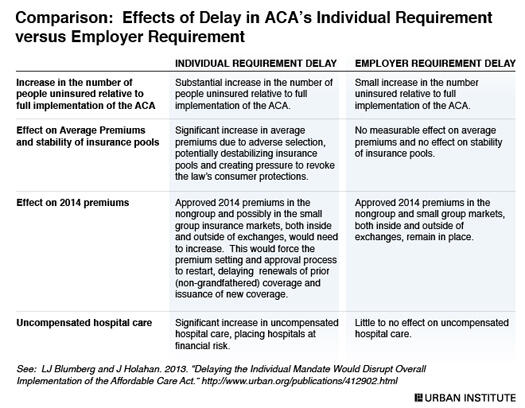BEYOND THE NUMBERS
House Republicans claim that a one-year delay of health reform’s individual mandate is “fair” because the Administration has also delayed for one year the employer responsibility requirement. They also claim that delaying part of the law — rather than fully defunding all of it — is a reasonable and harmless compromise. Both claims are false.
A one-year delay in the individual mandate is a central element of an effort to dismember health reform and would produce significant harm, as we pointed out in this earlier analysis. It would cause 11 million more Americans to remain uninsured in 2014 and result in higher premiums in the individual market for many others, according to the Congressional Budget Office (CBO). It also would disrupt the new health insurance exchanges, likely halting the open-enrollment season that started today and pushing back the date when coverage through the exchanges will take effect, now scheduled for January 1, 2014.
Indeed, that’s all a likely goal of those who seek a one-year delay. A year from now, they would demand another one-year delay and then another — or even outright repeal. They would likely argue that health reform has been unsuccessful, even though the individual mandate delay would cause the results they would likely cite as evidence, like sharply limited coverage gains and higher premiums in 2014.
Moreover, one can’t fairly equate the relatively modest impact of delaying the employer responsibility requirement with the serious harm resulting from delaying the mandate. The Urban Institute found that the Administration’s delay in the employer responsibility requirement would have only a small effect on coverage gains expected under the Affordable Care Act and not affect health insurance premiums in the individual market. It thus concluded that assuming that a similar delay in the individual mandate would produce similar effects would “be dangerously wrong.”
That’s consistent with CBO’s assessment. CBO previously estimated that the one-year delay in the employer responsibility requirement will increase the number of uninsured by less than 500,000 people in 2014. In contrast, the delay in the individual mandate would result in 11 million more people who are uninsured — 22 times more — in 2014, relative to current law.
This helpful table from the Urban Institute summarizes the impact of a delay in the individual mandate, compared with the effects of the delay in the employer responsibility requirement across several areas including coverage, premiums, and hospital uncompensated care.

